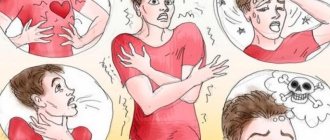Many people know what hypochondria is, since each of us has probably encountered episodes of increased concern about our own health.
It is this kind of fixation on the state of physical health with an indispensable search for various kinds of ailments and filing complaints with doctors that is called hypochondria.
The ancient Greeks used this term to describe anxiety that was so common in many patients. In the common sense, this medical term expresses melancholy and despondency. How to get rid of this condition still worries many - patients, their relatives, doctors.
From a medical point of view, hypochondria is primarily a psychiatric diagnosis. As a rule, patients with hypochondria have pronounced obsessive thoughts (obsessions) about the presence of a persistent and poorly treatable disease.
Psychiatrists distinguish hypochondria as a personality disorder (suspiciousness and morbidity have always been character traits of the patient) and a symptom of a serious mental disorder. It happens that a hypochondriac is absolutely convinced that he is sick with a particular illness, and immediately names it, but most often the nature of the illness, due to the suspiciousness of hypochondriacs, changes from case to case, and if yesterday it was one disease, then the next day it is completely different .
ICD-10 (the latest revision of the international classification of diseases) classifies hypochondria as a disorder of the so-called “somatoform” type. This is similar to the work of a placebo, when a person, taking a pacifier with the sauce of the proposed medicine, convinces himself of the presence of obvious side effects.
Also in this case, when a person begins to wind himself up, he actually receives certain physical signs. Most often, hypochondriacs are concerned about the condition of the heart, stomach, brain and genitals. At the same time, psychiatrists have discovered a close correlation with anxiety disorders.
Hypochondriac - who is this?
The word "hypochondriac" is most often used in a derogatory sense - mocking, close to contempt.
In colloquial language, this phrase means an imitator, that is, someone who "instills" illnesses into himself in order to gain sympathy and gain the attention of others. Is it really? A hypochondriac is a person who is overly focused on his or her health. Every slightest new symptom (or lack thereof) causes them great fear of the disease. Most often, a hypochondriac, having noticed any changes in his body, becomes convinced that this is a symptom of a serious illness.
Hypochondriac - definition
A hypochondriac is a person who suffers from self-suggestion disorder and seeks out symptoms of illnesses that have nothing to do with their health. A person suffering from the disorder hypochondriasis may be sure that he has some kind of disease and “provokes” the appearance of its symptoms and physical ailments.
Hypochondria is a serious disorder that is classified as a type of severe neurosis and obsessive-compulsive disorder. A person suffering from this disease lives in constant fear for the state of his health, which in turn creates severe stress, which weakens the body and can lead to the actual occurrence of diseases.
Hypochondriasis neurosis has different stages. It may seem to him that during the examination the doctors show excessive attention to him or, conversely, are hiding something. The hypochondriac is unable to control the black fear for his health and life, even if there is evidence that he is healthy.
Disease Avoidance Strategy
Hypochondria can manifest itself as a person’s belief that he is already sick, and as an obsessive thought that he will probably get sick. The latter forces a person to avoid unnecessary meetings with people (potential carriers of diseases) and fight germs in every possible way - up to obsessive-compulsive hand washing and treating everything around with antiseptics.
a severe hereditary disease in one of his relatives . So what if this relative is only the seventh water on the jelly and his disease was provoked by a number of various factors, all the same, the hypochondriac will “wait” for the beginning of the development of this disease genetically inherent in him (in his opinion).
Photo: Depositphotos
Of course, prudence is not a vice and it is necessary to take care of yourself and your body, but within the boundaries of common sense. This article in no way calls for neglecting your health, but still you should not cross the line of rationality , beyond which hypochondria begins.
For example, when going on a three-day trip, there is no need to allocate a separate suitcase for a first aid kit, which is more reminiscent of a mobile mini-pharmacy. You should also not remove appendicitis, tonsils and, just in case, all wisdom teeth just like that, for the purpose of prevention.
Tags: hypochondria, symptoms of the disease
Hypochondria - symptoms
A hypochondriac is a person who cannot cope with fear for his health and life. He lives in enormous stress and constant fear. He perceives every, even the smallest change in his body as a potential threat or fatal disease.
The hypochondriac is simultaneously afraid of being sick and confident that he is already sick . Because of this, people suffering from this disorder require frequent and thorough diagnosis, wanting to find out what is bothering them at all costs. At the same time, they often do not trust the results of the study and demand its repetition. Hypochondriacs , as a rule, do not trust their doctors - they constantly try to test their knowledge and skills, and, at the same time, ask for the same tests to be performed over and over again.
The symptoms of hypochondria from the beginning are easily confused with the symptoms of serious illnesses, because they affect the human psyche. The most common include:
- headaches, ailments of unknown origin,
- anxiety,
- excessive interest in changes and functioning of the body,
- frequent thoughts and conversations about diseases, attempts to get to the bottom of their symptoms.
What is hypochondria?
Hypochondria is a state of overly exaggerated worry about one’s health. At the same time, the individual is completely convinced that he has some kind of, often very serious, pathology, while no logical arguments have any effect on him. Even if the Minister of Health himself says that he is not sick, he will remain unconvinced.
Hypochondriacal inclusions can be characteristic of the pathology itself, which has this symptom as the basis of a hypochondriacal disorder, or it can be part of many other pathologies, simply as one of the symptoms. But the word hypochondriac has long taken its position in everyday use and is not always the name of pathology. Often this definition refers to whining people who complain about their health, constantly wailing, saying that they are hypochondriacs.
Hypochondria comes from the Greek words: hypo means under, and chondros means false ribs, sometimes they say hypochondrium. It was believed that this is where this pathological condition is located. Hypochondria was first described by Hippocrates, giving it a name accordingly. That is why the term comes from the name of the internal organs; then everything was associated with a specific organ. Later, hypochondria also came to mean pretense. Hypochondria and melancholy have somewhat similar meanings. Often ordinary people refer to hypochondria as a state akin to despondency. Characters with hypochondria are not uncommon in stories and films, since they bring a vivid type into the creation and immediately indicate the image of the desired character.
Hypochondria occurs (according to various sources) from 3 to 14% of people. It is believed that up to 10% of the population suffer from pathologies of this type. According to American data, there are twice as many such people. However, few of them go to the doctor. Hypochondriacs tend to self-medicate. It is known that in our country every third resident does this.
There are no specific studies of the incidence of hypochondria by gender, it is simply known that men often have pseudocardiac and intimate complaints, and women have migraines and general somatic disorders.
If we talk about hypochondria as a disease, then it is worth noting that this is a pathology of the neurotic spectrum, which occurs quite often among neurotics. It belongs to subtype F 45 according to ICD 10 - somatoform disorders. That is, disorders associated with somatic health complaints. Among these disorders, hypochondriacal disorder belongs to F 45.2.
There is no point in getting annoyed or scolding such people; they are sincerely confident in their pathologies, although they are very repulsive with their persistence and implausibility of complaints. It is typical that they tend to suspect very serious illnesses and, although they do not like to be treated by doctors, preferring self-medication, they still often call an ambulance. About 6% of emergency patients are people with hypochondriacal disorders. And naturally, if this is a personality type, then it gets worse with age. This is why older people are more inclined to exaggerate illnesses, paying undue attention to them. If hypochondriacal disorders affect young people, their ability to work is reduced, which immediately affects their social fulfillment.
Manifestations of hypochondria - examples
A hypochondriac is a difficult person to diagnose. The ailments he experiences and the fears he shares with his doctor seem reasonable. The best example of how the psyche affects a person is when a patient becomes nervous before measuring blood pressure. The fear that the test will show hypertension is so great that it actually increases blood pressure. Subsequent measurements show exactly the same symptoms. A patient may be prescribed treatment for a disease that he has never had.
The pain and illness experienced by a hypochondriac begin and end in his head. He is convinced that he carries the disease and receives confirmation of his theories.
Life with a suspicious person
A hypochondriac is a person with whom it is difficult to live. The immediate environment of a hypochondriac is constantly bombarded with information about possible diseases and detailed descriptions of ailments. The wife or husband of a hypochondriac often breaks up with their partner, unable to withstand the constant “throwing of problems at them.” This disease affects the life of the entire family, repeatedly ignoring the needs of other family members in favor of the hypochondriac.
Hypochondriacs are so focused on potential illnesses that they often ignore their spouse or children . This happens especially if they start arguing with him. A hypochondriac often does not want to admit to family and friends that he has a problem. In this case, every suggestion to visit a specialist is perceived by him as a personal insult. A hypochondriac is a person who is very easily offended and made to withdraw.
Life with a suspicious person is very difficult. This disorder, if not adequately treated, often expands. Fear becomes more and more, and the search for a diagnosis and analysis of diseases becomes the meaning of life for a hypochondriac . It is important to diagnose hypochondria in a timely manner, offer your help and try to get professional support (for example, in the form of a psychologist or psychotherapist).
Depression and schizophrenia
Hypochondriacal delusions often develop against the background of depression. In the early stages, the symptoms are almost identical, only a doctor is able to determine that the patient has depression or schizophrenia.
Depression is a type of mental disorder that affects every 10 Russians. Schizophrenia is a rare disease, occurring three times less frequently.
When a depressive state appears, the patient is often unable to determine what is happening to him. In addition, symptoms may vary. In practice, doctors are faced with depressed mood, melancholy, feelings of guilt, decreased self-esteem, and irritability.
A traumatic situation can lead to depression - financial difficulties, difficulties in personal relationships, death of loved ones. In this situation, a person begins to think about taking his own life. The patient spends a lot of time alone and turns to drugs and alcohol. You need to understand that depression is not just a bad mood. To make such a diagnosis, a severely depressed state must persist for at least two weeks.
At the beginning of schizophrenia, a person experiences a huge range of emotions, they can be accompanied by auditory and visual hallucinations, completely inappropriate for the moment. The patient has absurd thoughts that seem completely logical and reasonable to him.
The basic point of how to distinguish depression from schizophrenia is that depression often becomes one of the manifestations of schizophrenia.
Hypochondria - how to help?
The hypochondriac does not think rationally because fear deprives him of the ability to correctly judge the situation. Even if he has proof in the form of medical examinations, he is still convinced that some hidden disease lives somewhere in him. What can you do to help a hypochondriac?
First of all, it is worth trying to determine when the violation occurred and what event caused it. Hypochondria is a disease that runs from beginning to end in the psyche. May be caused by severe shock, such as the death of a loved one.
Distraction from potential illnesses can also help a hypochondriac combat this disorder. People suffering from this disease are overly attentive to their body. Look out for every change in the skin, every symptom of the disease. Concentration on the body enhances the perception of pain and also works as a kind of self-hypnosis. Thanks to the steps of distraction, you can help the hypochondriac in the fight against his own psyche.
Hypochondria - how to treat?
The hypochondriac suffers from severe obsessive-compulsive neurosis associated with constant fear for his health and his life. A common cause of hypochondria is the desire to be the center of attention. In collaboration with a psychologist or psychotherapist, you need to switch his attention to other aspects of life. A hypochondriac should have no benefit from talking about his symptoms because it satisfies his need to be the center of other people's attention.
Hypochondria can be treated with psychotropic medications that reduce its symptoms. Most often, the key to treatment is therapy, including behavioral-cognitive therapy, aimed at identifying the causes of the problem.
Treatment of hypochondria
Hypochondria is treated taking into account the aspect of the cause of its occurrence. Neurotic hypochondria is amenable to psychotherapeutic correction. It can be distinguished by the presence of some criticism of one’s problem, as well as the desire not to have these constant obsessive thoughts. After working with them, you can discover an effective change in behavior.
The fastest methods are hypnotic, but they give short-term results. At the same time, they are suitable for easily suggestible patients, which corresponds to the pathopsychic description of a neurotic. Regardless of the ideas of the disease, hypnosis contributes to their removal and some normal existence, but with new connections with psychotrauma, the condition can rebound and even worsen comparatively.
Cognitive behavioral psychotherapy is based on working with specific situations and attempts to destroy the pathological stereotype of behavior. It is already more effective, compared to suggestive techniques, but still its effect is not long-term enough, it often requires periodic reinforcement. And yet, cognitive behavioral therapy, in terms of its time/quality ratio, has a place in psychotherapy.
Client-centered, positive, existential, symbolic drama, gestal therapy, transactional analysis and similar psychotherapies are good at the support stage, but cannot always produce results in cases of pronounced naurotic process.
Psychoanalysis and its Jungian subtype can be considered the most effective methods, since they work deeply, precisely with the root causes inherent in childhood fears and unprocessed complexes. These techniques contribute to the development of personality and achieve harmony and a state of Zen.
There are also body-oriented practices that allow you to relieve tension and unnecessary symptoms, keeping the body in good shape. Art therapy hides excellent techniques that allow you to subconsciously deal with your problems.
Psychotherapy is not enough for delusional hypochondria; the use of antipsychotic drugs is often necessary. The following neuroleptics are suitable: Risperidone, Klopikmol, Moniten, Aminazin, Truxal, Haloperidol, Azaleptol, Soleron, Solian, Solex Galopril, Chlorpromazine, Rispaksol, Rispolept, Tizercin, Azapine, Queteron, Quedterpine, Olanzapine.
In depressive disorders with the presence of hypochondria, it is very important to prevent suicide, which is facilitated by hospitalization. To relieve depressive symptoms, antidepressants and, if necessary, tranquilizers are used: Paroxetine, Sertraline, Escitalopram, Fluosetine, Venlafaxine, Amitriptyline, Desipramine, Nortriptyline, Phenazepam, Grandaxin, Gidazepam, Nozepam.
If somatic symptoms are severe, beta blockers, nootropics, and vegetative stabilizers are included. It is necessary to exclude the influence of hazards and involve the patient in work processes.
Difficulties in treatment may be due to hypochondriacal characteristics. After reading the instructions, the patient will definitely find all the side effects and try to refuse to take the medicine. Here it is important to approach therapy competently, and sometimes not show the instructions and claim that these are herbs. But to solve this, a complex interaction between relatives and the treating doctor is important.
Hypochondria test - check if you have symptoms of hypochondria
A hypochondriac is a person with disorders that are difficult to diagnose. It can be both a signal of changes in the psyche and serious illnesses. However, there are some symptoms that may indicate hypochondria. Using the test we prepared, you can check whether you have symptoms of hypochondria.
- Do you often look at your body looking for any changes YES/NO
- Are you sure that there is a hidden disease in your body YES/NO
- For any minor changes in how you feel, go online YES/NO
- Do not trust doctors and their research YES/NO
- Do you like to talk to people about diseases that may affect you YES/NO
- When you read or hear about any disease, do you feel its symptoms, YES/NO
- Do you feel great fear at the thought of getting sick, YES/NO
- During the year you undergo many tests for the presence of various diseases YES/NO
If you answered yes to at least 4 questions, this is a sign that you may have hypochondria. To rule out other diseases, you should first consult a doctor and perform all the basic tests. After excluding physical causes, you should seek the help of a specialist - a psychologist or psychotherapist who specializes in the treatment of neuroses and hypochondria.










